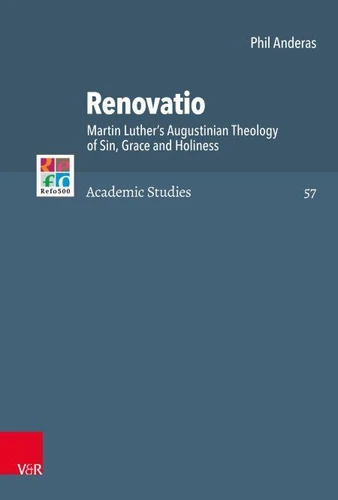Renovatio. Martin Luther's Augustinian Theology of Sin, Grace and Holiness
Par : , , , ,Formats :
Disponible dans votre compte client Decitre ou Furet du Nord dès validation de votre commande. Le format PDF est :
- Compatible avec une lecture sur My Vivlio (smartphone, tablette, ordinateur)
- Compatible avec une lecture sur liseuses Vivlio
- Pour les liseuses autres que Vivlio, vous devez utiliser le logiciel Adobe Digital Edition. Non compatible avec la lecture sur les liseuses Kindle, Remarkable et Sony
 , qui est-ce ?
, qui est-ce ?Notre partenaire de plateforme de lecture numérique où vous retrouverez l'ensemble de vos ebooks gratuitement
Pour en savoir plus sur nos ebooks, consultez notre aide en ligne ici
- Nombre de pages344
- FormatPDF
- ISBN978-3-647-59377-7
- EAN9783647593777
- Date de parution17/06/2019
- Protection num.pas de protection
- Taille2 Mo
- Infos supplémentairespdf
- ÉditeurVandenhoeck & Ruprecht
Résumé
Much mainstream Luther scholarship (and Lutheran theology) holds that Martin Luther downplayed, denied, derided, or just plain ignored "the holiness without which no one shall see the Lord" (Heb. 12:14). Phil Anderas advances a revisionist thesis: from the first inklings of his "Augustinian turn" c. 1514 to his death in 1546, Luther held and taught a robust theology of progressive renewal in holiness, carefully calibrated to the sober reality of residual sin and the astonishing gospel of grace in Jesus Christ.
As it is set forth in the works that embody Luther's most considered judgments (c. 1535-46), this gospel-centered and irreducibly trinitarian dogmatics of real renewal in holiness is "Augustinian" and "evangelical" in equal parts. As such, it commands the regard of theologians who stand in the tradition of the Church's doctor gratiae. The argument proceeds in three steps: first, an exposition of the mature Luther's dogmatics of sin, grace, and holiness; second, an investigation of the roots of this dogmatics in the theology of the "420s Augustine, " with whom a younger Luther was busily engaged c.
1514-16; third, an account of the continuities and discontinuities that characterize the development of Luther's theology from its embryonic state in the mid-1510s through the breakthroughs of the 1518-21 period to the settled position of the old Doctor.
As it is set forth in the works that embody Luther's most considered judgments (c. 1535-46), this gospel-centered and irreducibly trinitarian dogmatics of real renewal in holiness is "Augustinian" and "evangelical" in equal parts. As such, it commands the regard of theologians who stand in the tradition of the Church's doctor gratiae. The argument proceeds in three steps: first, an exposition of the mature Luther's dogmatics of sin, grace, and holiness; second, an investigation of the roots of this dogmatics in the theology of the "420s Augustine, " with whom a younger Luther was busily engaged c.
1514-16; third, an account of the continuities and discontinuities that characterize the development of Luther's theology from its embryonic state in the mid-1510s through the breakthroughs of the 1518-21 period to the settled position of the old Doctor.
Much mainstream Luther scholarship (and Lutheran theology) holds that Martin Luther downplayed, denied, derided, or just plain ignored "the holiness without which no one shall see the Lord" (Heb. 12:14). Phil Anderas advances a revisionist thesis: from the first inklings of his "Augustinian turn" c. 1514 to his death in 1546, Luther held and taught a robust theology of progressive renewal in holiness, carefully calibrated to the sober reality of residual sin and the astonishing gospel of grace in Jesus Christ.
As it is set forth in the works that embody Luther's most considered judgments (c. 1535-46), this gospel-centered and irreducibly trinitarian dogmatics of real renewal in holiness is "Augustinian" and "evangelical" in equal parts. As such, it commands the regard of theologians who stand in the tradition of the Church's doctor gratiae. The argument proceeds in three steps: first, an exposition of the mature Luther's dogmatics of sin, grace, and holiness; second, an investigation of the roots of this dogmatics in the theology of the "420s Augustine, " with whom a younger Luther was busily engaged c.
1514-16; third, an account of the continuities and discontinuities that characterize the development of Luther's theology from its embryonic state in the mid-1510s through the breakthroughs of the 1518-21 period to the settled position of the old Doctor.
As it is set forth in the works that embody Luther's most considered judgments (c. 1535-46), this gospel-centered and irreducibly trinitarian dogmatics of real renewal in holiness is "Augustinian" and "evangelical" in equal parts. As such, it commands the regard of theologians who stand in the tradition of the Church's doctor gratiae. The argument proceeds in three steps: first, an exposition of the mature Luther's dogmatics of sin, grace, and holiness; second, an investigation of the roots of this dogmatics in the theology of the "420s Augustine, " with whom a younger Luther was busily engaged c.
1514-16; third, an account of the continuities and discontinuities that characterize the development of Luther's theology from its embryonic state in the mid-1510s through the breakthroughs of the 1518-21 period to the settled position of the old Doctor.



